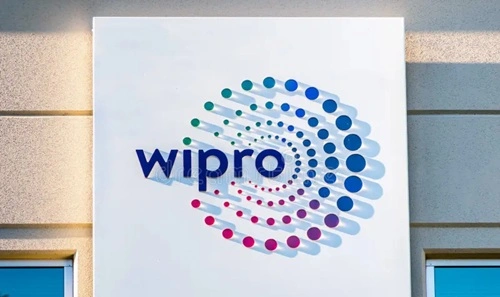Wipro, the fourth-largest Indian IT services firm, reported a strong Q1 FY26. Net profit rose 11% YoY to ₹3,330 crore, surpassing expectations, accompanied by an interim dividend and a ~4% jump in share price. Revenue was flat in constant currency (–2.3% QoQ CC), but margins improved to 17.3%, supported by cost discipline. Strong deal momentum—with large bookings up ~131% YoY to US$2.7 billion—and AI-centric strategy underline renewed growth focus. Despite global uncertainties and a minor headcount reduction, Wipro has positioned itself for sustainable performance.

Strengths
1. Robust Financial & Operational Performance: Q1 saw a 53.7% YoY surge in net profit (₹3,696 crore), and deal bookings rose 131% to US$2.7 billion, signaling strong execution and efficiency. Operating margins reached 17.3%, an 80 bps YoY expansion.
2. AI-First Strategy & Deal Pipeline: Wipro is integrating AI at the core, with all major deals embedding intelligent automation. Sixteen large deals—including two mega ones—demonstrate rising client confidence in AI-led solutions.
3. Global Reach & Service Diversification: Operating across 60+ countries, Wipro’s diversified services—cloud, cybersecurity, engineering, consulting—mitigate single-segment risk.
4. Strong Free Cash Flow & Shareholder Returns: Wipro’s operating cash flow was ₹4,112 crore). The company declared an interim dividend of ₹5/sh, and returned over US$1.3 billion to shareholders through buybacks and dividends .
5. Talent Strategy & ESG Credentials: Wipro has trained ~87,000 employees in generative AI, maintained attrition under 15%, and achieved gender diversity—women make up 37% of workforce and 33% of its board. It was recognized as a DEI Lighthouse by WEF.
Weaknesses
1. Revenue Growth Pressure: While profits rose, constant currency revenue declined ~2.3% QoQ and was flat YoY, trailing peers like TCS and Infosys.
2. Overdependence on North America & Europe: About 55% of revenues come from North America, making Wipro vulnerable to geopolitical or macroeconomic shocks.
3. Lower Margins vs. Peers: At ~17.3%, Wipro’s margins lag behind TCS (~24%) and Infosys (~21%), indicating room for improvement.
4. Workforce Pruning Indicators: The recent reduction of ~100 jobs in Q1 signals cautious cost control but may point to broader macro concerns .
Opportunities
1. AI & Automation Tailwinds: Client investment in generative AI, data analytics, and automation offers Wipro scope to increase wallet share and consulting-led engagements.
2. Leveraging Large Deals: With a strong pipeline of large deals (~US$5B total bookings), Wipro can drive sustainable revenue growth through execution excellence.
3. Consulting & Cloud Push: Growing demand for end-to-end cloud migration and digital consulting enhances opportunities in high-margin practices.
4. ESG & Diversity Advantage: Wipro’s DEI recognition and sustainability credentials can appeal to ESG-conscious clients and global investors.
5. Upscaling in Emerging Services: Cybersecurity, engineering, and product development services (e.g., Wipro Ventures) are long-term high-growth frontiers.
Threats
1. Macro & Geopolitical Risks: Global uncertainty, tariff fluctuations, and tighter IT budgets in key markets could suppress growth .
2. Intensifying Competition: Peers (TCS, Infosys, Cognizant) and specialized consultancies pose margin pressures and demand constant value-addition.
3. Talent Retention Challenges: Maintaining high retention and skilling amidst sectorwide talent scarcity remains critical.
4. Pricing & Deal Risks: Client pressure for discounts or delays in large transformation programs may disrupt cash flow and margin forecasts.
Future Outlook
Revenue Stabilization & Growth Re-acceleration: As AI-led deals ramp up, Wipro expects Q2 FY26 revenue growth of 1–1.5% CC QoQ—signalling stabilization .
Margin Expansion Through Automation: Continued margin gains are possible via delivery leverage, offshore sourcing, and scaled automation, provided client budgets hold steady.
Execution of Mega Deals: Successful deployment and execution of US$5 billion+ pipeline can shift the narrative from pipeline strength to real earnings impact.
Deepening AI-led Competency: Investments in training, academia partnerships, and leadership in generative AI position Wipro as a preferred AI transformation partner.
Geographic & Vertical Diversification: Reducing North America dependency and expanding into Europe, APAC, and emerging markets can hedge macro risks.
ESG Leadership as Differentiator: Maintaining DEI and sustainability credentials helps attract talent and clients focused on ethical and inclusive partnerships.
Wipro delivered a standout Q1 FY26, combining strong profits with AI-driven deal momentum and margin discipline. To sustain this, it must translate pipeline strength into consistent, diversified growth, while navigating macro uncertainties and sharpening operational capabilities. The next 12–18 months will be pivotal for Wipro’s transition from turnaround mode to durable leadership in the new-age IT landscape.